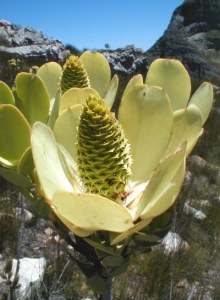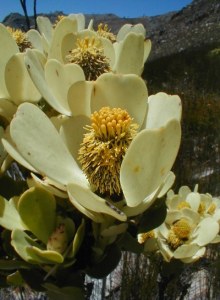
Home
Mission
Overview of Project
Project Staff
Sponsors
Achievements
Checking, Illustrations
Upcoming Activities
Id and Species Lists
Protea Information
Protea Gallery
Growing Proteas
Interim Dist. Maps
Publications
Afrikaanse Inligting
![]()
Ld climacticum type material collected
 On 12 November 2001 John
Rourke, Colin Paterson-Jones, Nigel Forshaw, Félix Forest and Tony Rebelo, took the high
road to see Climax Conebush - Ld climacticum.
This was not our first visit, two other visits since its discovery were required to pin
down the flowering time of this species: Nigel Forshaw, Wendy Hitchcock, Pat Holmes, Wendy
Paisley, Fiona Powrie, Stephen Richardson, Sandy Smuts and Ken Thomas, visited on 11
August; Félix Forest, Nigel Forshaw, Tony Rebelo, Gail Reeves and Stephen Richardson,
visited on 16 October. This brings to 14 the people who have seen the new species.
On 12 November 2001 John
Rourke, Colin Paterson-Jones, Nigel Forshaw, Félix Forest and Tony Rebelo, took the high
road to see Climax Conebush - Ld climacticum.
This was not our first visit, two other visits since its discovery were required to pin
down the flowering time of this species: Nigel Forshaw, Wendy Hitchcock, Pat Holmes, Wendy
Paisley, Fiona Powrie, Stephen Richardson, Sandy Smuts and Ken Thomas, visited on 11
August; Félix Forest, Nigel Forshaw, Tony Rebelo, Gail Reeves and Stephen Richardson,
visited on 16 October. This brings to 14 the people who have seen the new species.
The 12 August 2001 visit was just to ensure that the species was not about to flower out of season and perhaps to pinpoint exactly when this important event might occur. The plants were in late bud, but John Rourke pointed out on our return that they were in the same state of bud on its discovery in March. He predicted a November flowering time.

 The 16
October 2001 yielded quite a different picture. A single female and two male flowerheads
were in flower. But the "lollipops" had turned a bright ivory colour. Most of
the flowerheads were still tightly in their bud bracts, but the female flowerhead had shed
all the bracts to reveal the cone with all flowers open. The shedding of the bracts is
quite remarkable, changing the conical bud into a normal Conebush cone. And a few small
beetles with ridged elytra were in residence. We predicted flowering in early November.
The 16
October 2001 yielded quite a different picture. A single female and two male flowerheads
were in flower. But the "lollipops" had turned a bright ivory colour. Most of
the flowerheads were still tightly in their bud bracts, but the female flowerhead had shed
all the bracts to reveal the cone with all flowers open. The shedding of the bracts is
quite remarkable, changing the conical bud into a normal Conebush cone. And a few small
beetles with ridged elytra were in residence. We predicted flowering in early November.
On 12 November 2001 we finally got to the plants to find the mature plants all in flower: the first time this species has been seen in flower. The 16 young plants showed no sign of producing reproductive stems. These we later worked out were about 3 years old. In fact, the reason why they escape the December 2000 fire was because the veld was too young. The adult plants had obviously survived the 3-year ago burn.
After Colin had taken his photographs John was allowed to collect his six herbarium specimens (each sex each for Kew, Pretoria and Compton Herbaria). These were as long as John! Carefully wrapped up in plastic they protruded from his rucksack like Roman standards.
The big surprise was the Conebush’s pollination system. Ever since Asa Hemborg’s article (PAN52.9) on Conebush pollination I have been looking carefully for beetles in Conebushes and found only very low numbers! And here we have a Conebush that is crawling with insects! One plant had 5 Protea Scarab Beetles in three heads. Most had flies, the odd solitary bee, and even butterflies (the Painted Lady) and odd beetles. But all were positively crawling with a beetle with ridged elytras. Male and female flowerheads were both crawling with goggas. Mind you, so was Nigel – his white shirt, wet where he had removed his rucksack, also attracted dozens of the beetles. Could this be why this species is so rare? – it squanders its resources on attracting pollinators!
The web prize for correctly predicting the flowering season of Ld climacticum goes to Ivor Jardine. Lots of pictures of the plants and us visiting them are available on the web at www.nbi.ac.za/protea
You will have to wait for the official name of the species. Suffice to say it translates as "excessive" or "lacking moderateness"
Have a look at the Discovery of Ld climacticum and more about Ld climacticum
Tony Rebelo
Back PAN 53